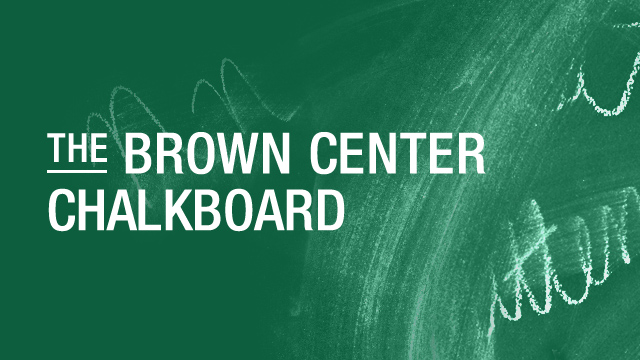The 2016 Brown Center Report (BCR), which was published last week, presented a study of Common Core State Standards (CCSS). In this post, I’d like to elaborate on a topic touched upon but deserving further attention: what to expect in Common Core’s immediate political future. I discuss four key challenges that CCSS will face between now and the end of the year.
Let’s set the stage for the discussion. The BCR study produced two major findings. First, several changes that CCSS promotes in curriculum and instruction appear to be taking place at the school level. Second, states that adopted CCSS and have been implementing the standards have registered about the same gains and losses on NAEP as states that either adopted and rescinded CCSS or never adopted CCSS in the first place. These are merely associations and cannot be interpreted as saying anything about CCSS’s causal impact. Politically, that doesn’t really matter. The big story is that NAEP scores have been flat for six years, an unprecedented stagnation in national achievement that states have experienced regardless of their stance on CCSS. Yes, it’s unfair, but CCSS is paying a political price for those disappointing NAEP scores. No clear NAEP differences have emerged between CCSS adopters and non-adopters to reverse that political dynamic.
“Yes, it’s unfair, but CCSS is paying a political price for those disappointing NAEP scores. No clear NAEP differences have emerged between CCSS adopters and non-adopters to reverse that political dynamic.”
TIMSS and PISA scores in November-December
NAEP has two separate test programs. The scores released in 2015 were for the main NAEP, which began in 1990. The long term trend (LTT) NAEP, a different test that was first given in 1969, has not been administered since 2012. It was scheduled to be given in 2016, but was cancelled due to budgetary constraints. It was next scheduled for 2020, but last fall officials cancelled that round of testing as well, meaning that the LTT NAEP won’t be given again until 2024.
With the LTT NAEP on hold, only two international assessments will soon offer estimates of U.S. achievement that, like the two NAEP tests, are based on scientific sampling: PISA and TIMSS. Both tests were administered in 2015, and the new scores will be released around the Thanksgiving-Christmas period of 2016. If PISA and TIMSS confirm the stagnant trend in U.S. achievement, expect CCSS to take another political hit. America’s performance on international tests engenders a lot of hand wringing anyway, so the reaction to disappointing PISA or TIMSS scores may be even more pronounced than what the disappointing NAEP scores generated.
Is teacher support still declining?
Watch Education Next’s survey on Common Core (usually released in August/September) and pay close attention to teacher support for CCSS. The trend line has been heading steadily south. In 2013, 76 percent of teachers said they supported CCSS and only 12 percent were opposed. In 2014, teacher support fell to 43 percent and opposition grew to 37 percent. In 2015, opponents outnumbered supporters for the first time, 50 percent to 37 percent. Further erosion of teacher support will indicate that Common Core’s implementation is in trouble at the ground level. Don’t forget: teachers are the final implementers of standards.
An effort by Common Core supporters to change NAEP
The 2015 NAEP math scores were disappointing. Watch for an attempt by Common Core supporters to change the NAEP math tests. Michael Cohen, President of Achieve, a prominent pro-CCSS organization, released a statement about the 2015 NAEP scores that included the following: “The National Assessment Governing Board, which oversees NAEP, should carefully review its frameworks and assessments in order to ensure that NAEP is in step with the leadership of the states. It appears that there is a mismatch between NAEP and all states’ math standards, no matter if they are common standards or not.”
Reviewing and potentially revising the NAEP math framework is long overdue. The last adoption was in 2004. The argument for changing NAEP to place greater emphasis on number and operations, revisions that would bring NAEP into closer alignment with Common Core, also has merit. I have a longstanding position on the NAEP math framework. In 2001, I urged the National Assessment Governing Board (NAGB) to reject the draft 2004 framework because it was weak on numbers and operations—and especially weak on assessing student proficiency with whole numbers, fractions, decimals, and percentages.
Common Core’s math standards are right in line with my 2001 complaint. Despite my sympathy for Common Core advocates’ position, a change in NAEP should not be made because of Common Core. In that 2001 testimony, I urged NAGB to end the marriage of NAEP with the 1989 standards of the National Council of Teachers of Mathematics, the math reform document that had guided the main NAEP since its inception. Reform movements come and go, I argued. NAGB’s job is to keep NAEP rigorously neutral. The assessment’s integrity depends upon it. NAEP was originally intended to function as a measuring stick, not as a PR device for one reform or another. If NAEP is changed it must be done very carefully and should be rooted in the mathematics children must learn. The political consequences of it appearing that powerful groups in Washington, DC are changing “The Nation’s Report Card” in order for Common Core to look better will hurt both Common Core and NAEP.
Will Opt Out grow?
Watch the Opt Out movement. In 2015, several organized groups of parents refused to allow their children to take Common Core tests. In New York state alone, about 60,000 opted out in 2014, skyrocketing to 200,000 in 2015. Common Core testing for 2016 begins now and goes through May. It will be important to see whether Opt Out can expand to other states, grow in numbers, and branch out beyond middle- and upper-income neighborhoods.
Conclusion
Common Core is now several years into implementation. Supporters have had a difficult time persuading skeptics that any positive results have occurred. The best evidence has been mixed on that question. CCSS advocates say it is too early to tell, and we’ll just have to wait to see the benefits. That defense won’t work much longer. Time is running out. The political challenges that Common Core faces the remainder of this year may determine whether it survives.
The Brookings Institution is committed to quality, independence, and impact.
We are supported by a diverse array of funders. In line with our values and policies, each Brookings publication represents the sole views of its author(s).





